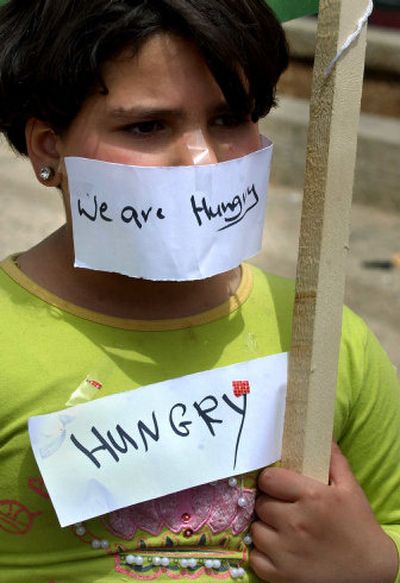Unpaid workers pressure Hamas

GAZA CITY, Gaza Strip – Hundreds of Palestinians staged strikes and demonstrations Saturday in the West Bank and Gaza Strip to demand payment of overdue salaries to government workers – the first public signs of discontent with the Hamas-led Cabinet’s handling of the financial crisis.
In the West Bank city of Hebron, separate clashes between Israeli police and Jewish settlers early today left at least eight people wounded, as hundreds of forces prepared to evict a group of settlers illegally occupying a Palestinian home.
The evacuation provided an important test for the new government of Prime Minister Ehud Olmert, who plans a broad pullout from the West Bank.
The Palestinian unrest occurred ahead of a meeting in Gaza between Prime Minister Ismail Haniyeh of Hamas and moderate President Mahmoud Abbas. The two, involved in a power struggle since Hamas defeated Abbas’ Fatah Party in January legislative elections, failed to resolve their differences but agreed to meet again today.
Haniyeh has complained that Abbas has stripped the government of many of its powers. Abbas, who seeks a resumption of peace talks with Israel, wants Hamas to soften its hard line against the Jewish state.
Hamas’ tough stance has led Western donors to cut vital aid to the Palestinians, leaving the government broke.
After the Cabinet took office in late March, the United States and European Union, the two biggest donors to the Palestinian Authority, cut off hundreds of millions of dollars in aid.
Hamas has rejected the calls, despite a financial crunch that has left the treasury unable to pay the salaries of 165,000 government workers for the past two months. The government is the largest employer in the West Bank and Gaza Strip, and many families are scraping by on dwindling savings, loans and handouts.
Until now, the Palestinian public had heeded calls for patience, largely following the government in blaming the crisis on Western hostility to Hamas.
On Saturday, however, teachers at five schools in Hebron canceled classes – a strike that affected only a small number of schools but marked a change in attitude.
“I haven’t received a salary for 66 days. Of course I’m not happy with the government,” said one teacher. “I need to live and I need to feed my children.”
In Nablus, also in the West Bank, hundreds of Palestinian government workers demonstrated to demand their salaries.
“If this government can’t function, it has to think carefully about its people and change its political way of thinking,” said Sheik Majed Dwikat, a religious leader.
In the Gaza city of Rafah, about 150 protesters, mostly women and children, urged Hamas to pay the salaries.
Late Saturday, Russia delivered $10 million in emergency aid to the Palestinians, bypassing the Hamas-led government by sending the money to Abbas’ office.